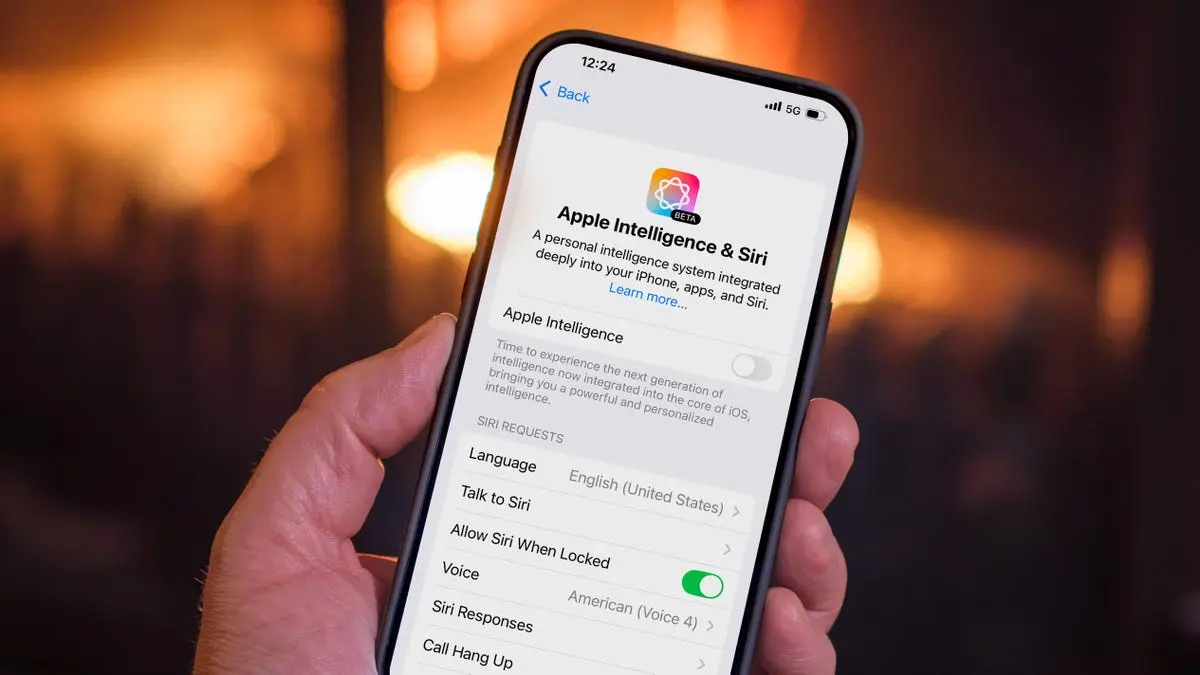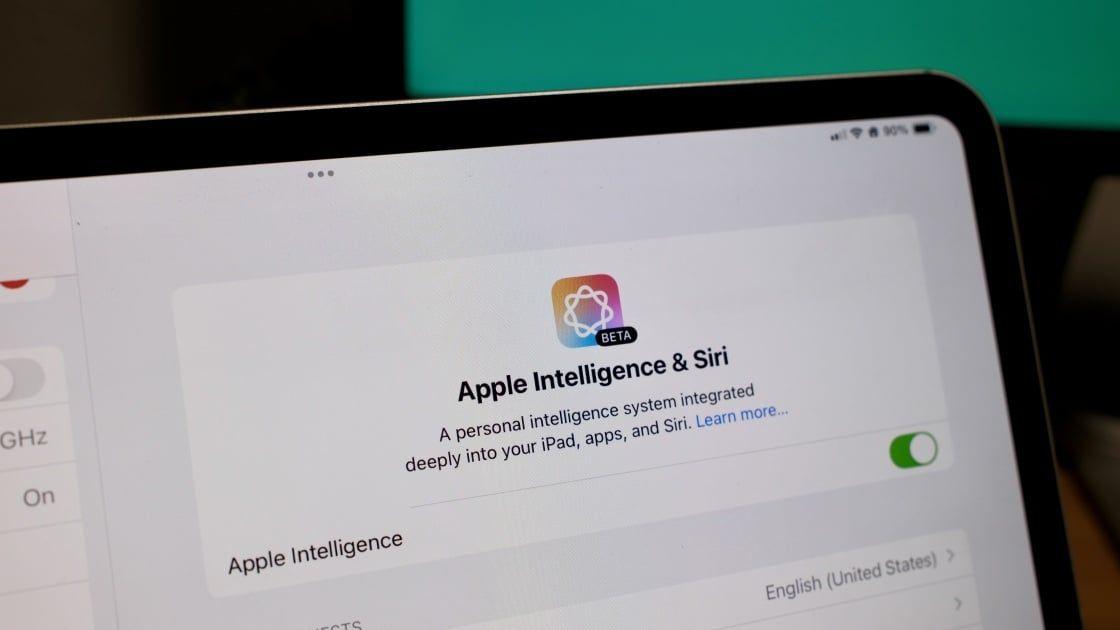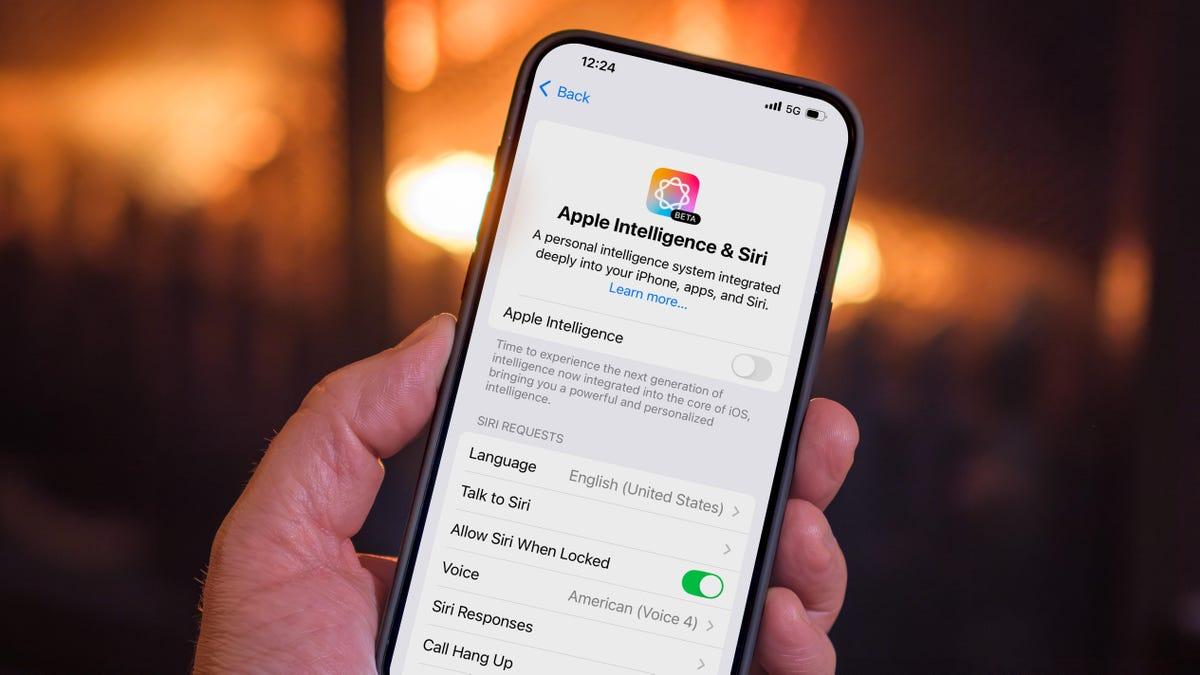Apple Intelligence: User Adoption, Privacy Concerns, and How to Manage AI Features on iPhones
2 Sources
2 Sources
[1]
You Can Turn Off Apple Intelligence on Your iPhone If You're Not Using It. Here's How
Apple Intelligence definitely has its benefits -- I use several features every day. But it's not for everyone, and that's OK. A new CNET survey finds that just 19% of US smartphone owners are choosing to upgrade their devices to take advantage of new AI features. And a recent ZDNET/Aberdeen survey reveals that the majority of US adults say they will not use most AI features, and just 8% would consider paying extra for them. Some AI features are more welcome than others, with 58% of respondents saying using AI for photo editing would be valuable. The good news is that it's easy to turn Apple Intelligence off entirely or selectively switch off individual features. See also: Did a well-meaning friend send you a message about Apple Intelligence possibly reading your private information? I explain what's actually going on. Since the first Apple Intelligence features rolled out in iOS 18.1, some people have opted out of the new technology. Tools such as Image Playground, Genmoji and message summaries can use up to 7GB of your device's internal storage -- a sizable chunk, especially if you tend to run against the upper limit of its free space. Even if storage is not an issue, you just may not be interested in Apple's set of AI features. According to a new survey by SellCell, 73% of Apple users think AI adds little to no value to the experience. In a separate survey, CNET found that 25% of smartphone owners aren't interested at all. Or, honestly, you may not want to deal with features that are creating inaccurate summaries or that can be replicated without Apple Intelligence. (Earlier iOS 18 updates re-enabled Apple Intelligence automatically even if you had turned it off, but as of iOS 18.4, the setting is honored.) The good news is that it's easy to turn off Apple Intelligence entirely. Or if you'd prefer to pick and choose, you can selectively disable some of the features. Doing so also lets you reclaim the storage it's using. I'm not an AI crank -- I appreciate features such as notification summaries and the Clean Up tool in the Photos app. And yet, Apple Intelligence is also a work in progress, an evolving set of features that Apple is heavily hyping while gradually developing. I wouldn't hold it against you if you wanted to not be distracted or feel like you're doing Apple's testing for them (that's what the developer and public betas are for). Remember that Apple Intelligence works only on the iPhone 15 Pro, iPhone 16, iPhone 16E, iPhone 16 Pro or M-series Macs and iPads, plus the newest iPad mini. Here's what you need to know about disabling it. If you're concerned about the storage requirements of Apple Intelligence, you can find out how much the system is using by going to Settings > General > iPhone (or iPad) Storage > iOS (or iPadOS). Note that even after turning off Apple Intelligence, that storage still shows up in the iOS Storage list. However, I was able to confirm that if the phone's storage fills up and the system needs that now-inactive space, iOS reclaims what it needs. (Curiously, the Clean Up tool in Photos sticks around even when Apple Intelligence is turned off, perhaps because the first time you use it the app downloads resources for it and holds onto them.) Maybe you're finding some Apple Intelligence features helpful while others are annoying (or just highly amusing). You can turn off specific features in the settings for apps to which they apply. For example, to disable text summaries in Messages notifications, go to Settings > Apps > Messages and switch off the Summarize Messages option. Some features are not as app-specific. Writing Tools, which use Apple Intelligence to proof or rewrite text, appear as an option when you select text, regardless of the app. To turn that off, you need to disable Apple Intelligence system-wide. Also note that nearly every app includes an Apple Intelligence & Siri option in Settings, with a Learn from this App option (turned on by default). That applies just to whether Apple Intelligence and Siri can monitor how you use it to make suggestions; it doesn't affect any particular Apple Intelligence features. Another option for restricting what Apple Intelligence can do is buried in the Screen Time settings. Screen Time is designed to control which apps and features can run on another device, such as the iPhone used by a child in your household. But it's also helpful for tracking how much time you're spending on the device and, in this case, turning off some components of Apple Intelligence.
[2]
AI Overload? How to Turn Off the Worst Apple Intelligence Features (and Keep the Ones You Like)
Apple Intelligence hasn't quite lived up to the hype. Writing Tools, ChatGPT integration, Genmoji, and Image Playground have added supplementary improvements to iOS, but notification summaries for news were temporarily paused for hallucinations, and Siri's promised AI revamp has been significantly delayed. And yet, Apple Intelligence was turned on by default in iOS 18.3. Thankfully, Apple makes it relatively easy to turn off in Settings. But what if you want to keep some Apple Intelligence features and ditch others? Your options are limited, but here's what you can do. How to Turn Off Apple Intelligence The simplest approach to dealing with Apple Intelligence features is to disable them. Open Settings > Apple Intelligence & Siri and turn the toggle next to Apple Intelligence to off. This turns off all AI capabilities throughout the operating system, but some features will still be visible. For instance, the Image Playground app for image generation stays on the phone but won't work. Previously created images will remain, but a message will tell you that future creation is disabled until Apple Intelligence is turned back on. Similarly, Genmoji creation will disappear but previously created emoji will still be available to send. How to Turn Off Apple Intelligence Notification Summaries Notification summaries are intended to help people quickly catch up on lengthy chat threads, putting only the most important information on the screen (date and time for a meet-up, for example). That can be useful -- unless it incorrectly summarizes a news alert. If you'd rather parse the group chat yourself, Apple offers a way to turn off these summaries without disabling other Apple Intelligence features like Writing Tools and Genmoji. Go to Settings > Notifications > Summarize Notifications. When you first turn this on, Apple will let you pick which notifications to summarize -- News & Entertainment, Communication & Social, and All Other Apps. So, in this setting, you can choose to turn off summaries completely or pick and choose based on an app. If you're running iOS 18.4 and up, you have a Priority Notifications option, which will show you the notifications that Apple Intelligence deems most important on a separate part of the Lock Screen. You can enable or disable it via Settings > Notifications. Use Screen Time to Block Apple Intelligence Features To block elements of Apple Intelligence on your device, or any that you manage, turn to Screen Time. Apple recommends that image creation tools be used by kids 12 and older, while the ChatGPT extension be used by kids 13 and older. To manage these features, open Settings > Screen Time > Content & Privacy Restrictions, and tap Intelligence & Siri. Here, you can allow or block Image Creation, Writing Tools, and ChatGPT Extension. (You can also axe Math Notes if you don't want Apple doing your kids' homework.)
Share
Share
Copy Link
A comprehensive look at Apple's AI features, their adoption rates, and how users can manage or disable them on their devices.
Apple Intelligence: A Mixed Reception
Apple's foray into AI with its Intelligence features has met with a mixed response from users. Recent surveys indicate a lukewarm reception to these new capabilities. According to a CNET survey, only 19% of US smartphone owners are upgrading their devices specifically for AI features
1
. Furthermore, a ZDNET/Aberdeen survey reveals that the majority of US adults do not plan to use most AI features, with a mere 8% considering paying extra for them1
.User Adoption and Perceived Value
The adoption of Apple Intelligence features appears to be slow, with many users questioning their value. A survey by SellCell found that 73% of Apple users believe AI adds little to no value to their experience
1
. This sentiment is echoed in CNET's findings, where 25% of smartphone owners expressed no interest in these features at all1
.However, not all AI features are equally unwelcome. The surveys indicate that 58% of respondents find AI for photo editing valuable, suggesting that some applications of the technology are more appealing than others
1
.Storage and Performance Considerations
One practical concern for users is the storage requirements of Apple Intelligence. These features can use up to 7GB of a device's internal storage, which may be significant for users with limited free space
1
. This storage usage persists even after disabling the features, although iOS can reclaim the space if needed1
.Privacy and Accuracy Concerns
Some users have expressed concerns about privacy, with rumors circulating about Apple Intelligence potentially reading private information
1
. While these concerns may be exaggerated, they highlight the need for clear communication about data usage and privacy safeguards.Additionally, there have been issues with the accuracy of some features. For instance, notification summaries for news were temporarily paused due to hallucinations, indicating that the technology is still evolving and may have limitations
2
.Related Stories
Managing Apple Intelligence Features
For users who are hesitant about embracing all aspects of Apple Intelligence, there are several options to manage these features:
- Complete Disable: Users can turn off Apple Intelligence entirely through the Settings app
1
2
.

Source: CNET
-
Selective Disabling: It's possible to disable specific features while keeping others. For example, users can turn off text summaries in Messages notifications without disabling other AI capabilities
1
. -
Screen Time Controls: The Screen Time settings offer another layer of control, allowing users to restrict certain AI features, which is particularly useful for managing children's device usage
1
2
.

Source: PC Magazine
- Notification Management: Users can customize which types of notifications are summarized by AI, offering a middle ground between full adoption and complete disabling of the feature
2
.
Device Compatibility and Future Outlook
It's worth noting that Apple Intelligence is currently limited to newer devices, including the iPhone 15 Pro, iPhone 16 series, M-series Macs and iPads, and the newest iPad mini
1
. This limited compatibility may contribute to the slow adoption rates.As Apple continues to develop and refine these features, user perception and adoption may change. The company's approach of gradually developing and heavily promoting these features suggests that Apple sees AI as a significant part of its future ecosystem, despite the current mixed reception
1
.References
Summarized by
Navi
Related Stories
Apple Intelligence Automatically Re-Enabled in iOS 18.3.2 Update, Frustrating Users
12 Mar 2025•Technology

Apple's Latest Update Inadvertently Re-enables AI Features, Raising Privacy and User Choice Concerns
12 Feb 2025•Technology

Apple Intelligence Now Enabled by Default: How to Opt Out of iOS 18.3's AI Features
22 Jan 2025•Technology

Recent Highlights
1
ByteDance's Seedance 2.0 AI video generator triggers copyright infringement battle with Hollywood
Policy and Regulation

2
Demis Hassabis predicts AGI in 5-8 years, sees new golden era transforming medicine and science
Technology

3
Nvidia and Meta forge massive chip deal as computing power demands reshape AI infrastructure
Technology





